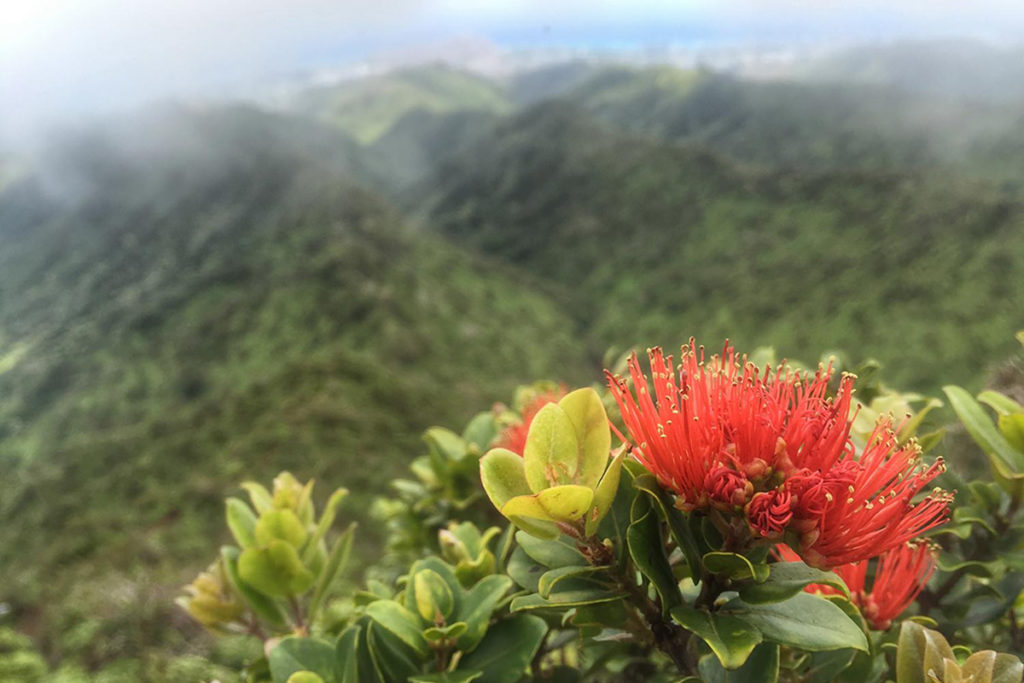‘Ōhiʻa Quarantine Alert for Merrie Monarch Festival Attendees
 Travelers to the Merrie Monarch Festival (April 1 through 7, 2018) should be aware of quarantine restrictions regarding the transport of ‘ōhi‘a from Hawai‘i Island due to a serious plant disease—rapid ‘ōhi‘a death (ROD)—which is devastating the island’s native forests.
Travelers to the Merrie Monarch Festival (April 1 through 7, 2018) should be aware of quarantine restrictions regarding the transport of ‘ōhi‘a from Hawai‘i Island due to a serious plant disease—rapid ‘ōhi‘a death (ROD)—which is devastating the island’s native forests.
The quarantine restricts the movement of ‘ōhi‘a plants and plant parts, including flowers, leaves, seeds, stems, twigs, cuttings, untreated wood, logs, mulch greenwaste and frass (sawdust from boring insects) and any soil from Hawai‘i Island. Transport of such items is only allowed with a permit issued by the Hawai‘i Department of Agriculture (HDOA).
“We ask that everyone be mindful of the quarantine restrictions,” said Scott Enright, chairperson of the Hawai‘i Board of Agriculture. “So far, we have been able to prevent the spread of the disease to other islands and continued vigilance is essential.”
HDOA’s Plant Quarantine Branch will be sending crews of inspectors from across the state to airports in both Hilo and Kona to boost inspection capacity near the end of the Merrie Monarch Festival.
From April 6 to 9, special inspection stations will be set up at the airports where passengers may turn in any ‘ōhi‘a material before boarding flights. Plant Quarantine offices in Kona and Hilo will also accept ‘ōhi‘a material for proper disposal.
The Hawai‘i Board of Agriculture issued the emergency quarantine in August 2015 to stop the spread of the plant fungus from Hawai‘i Island to other islands. Any person who violates the quarantine rule may be charged with a misdemeanor and fined not less than $100 with a maximum fine of $10,000. For a second offense committed within five years of a prior conviction under this rule, the person or organization shall be fined not less than $500 and not more than $25,000.
HDOA Plant Quarantine inspectors have printed an ‘ōhi‘a quarantine informational flyer that explains the quarantine and what travelers cannot transport off of Hawai‘i Island.
Information is also available on the department’s website.
The Merrie Monarch Festival draws dozens of hula halau and hundreds of spectators to Hawai‘i Island. It is important to note that the very act of harvesting ‘ōhi‘a may spread the disease as spores may be carried in soil and by harvesting tools, vehicles, shoes and clothing to uninfected areas.
Multi-agency ROD working groups have been meeting with Native Hawaiian groups, the Merrie Monarch organization and other community groups to provide advice and guidance on the handling of ohia material.
ROD was first noticed in 2010 in Puna. In 2014, the fungus was initially identified as Ceratocystis fimbriata by researchers at the U.S. Department of Agriculture’s Daniel K. Inouye Agricultural Research Service. Recent research has reclassified Ceratocystis fimbriata into two distinct species that are new to science—Ceratocystis lukuohia and Ceratocystis huliohia.
In 2014, it was estimated that the disease covered approximately 6,000 acres from Kalapana to Hilo and exhibited tree mortality rates of more than 50%.
Currently, it is estimated to infect about 135,000 acres around Hawai‘i Island. So far, the disease has not been found on other islands. It is not known how the disease entered the state or where it came from.
Travelers seeking more inspection information may contact HDOA’s Plant Quarantine offices:
Hilo (808) 974-4141
Kona (808) 326-1077
Maui (808) 872-3848
Honolulu (808) 837-8413
Kaua‘i (808) 241-7135
More information on ROD may be found at:
UH-College of Tropical Agriculture & Human Resources website
HDOA website
HDOA Information Flyer on ROD Quarantine
Sponsored Content
Comments






_1770333123096.webp)







